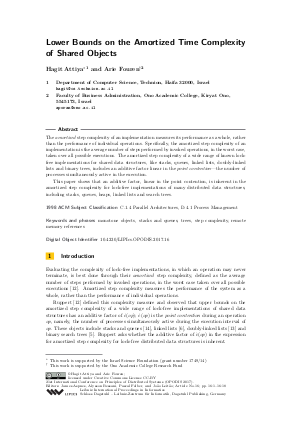Lower Bounds on the Amortized Time Complexity of Shared Objects
Authors Hagit Attiya, Arie Fouren
-
Part of:
Volume:
21st International Conference on Principles of Distributed Systems (OPODIS 2017)
Part of: Series: Leibniz International Proceedings in Informatics (LIPIcs)
Part of: Conference: International Conference on Principles of Distributed Systems (OPODIS) - License:
 Creative Commons Attribution 3.0 Unported license
Creative Commons Attribution 3.0 Unported license
- Publication Date: 2018-03-28
File

PDF
LIPIcs.OPODIS.2017.16.pdf
- Filesize: 1.31 MB
- 18 pages
Document Identifiers
Subject Classification
Keywords
- monotone objects
- stacks and queues
- trees
- step complexity
- remote memory references
Metrics
- Access Statistics
-
Total Accesses (updated on a weekly basis)
0Document
0Metadata
Abstract
The amortized step complexity of an implementation measures its performance as a whole, rather than the performance of individual operations. Specifically, the amortized step complexity of an implementation is the average number of steps performed by invoked operations, in the worst case, taken over all possible executions. The amortized step complexity of a wide range of known lock- free implementations for shared data structures, like stacks, queues, linked lists, doubly-linked lists and binary trees, includes an additive factor linear in the point contention—the number of processes simultaneously active in the execution. This paper shows that an additive factor, linear in the point contention, is inherent in the amortized step complexity for lock-free implementations of many distributed data structures, including stacks, queues, heaps, linked lists and search trees.
Cite As Get BibTex
Hagit Attiya and Arie Fouren. Lower Bounds on the Amortized Time Complexity of Shared Objects. In 21st International Conference on Principles of Distributed Systems (OPODIS 2017). Leibniz International Proceedings in Informatics (LIPIcs), Volume 95, pp. 16:1-16:18, Schloss Dagstuhl – Leibniz-Zentrum für Informatik (2018)
https://doi.org/10.4230/LIPIcs.OPODIS.2017.16
BibTex
@InProceedings{attiya_et_al:LIPIcs.OPODIS.2017.16,
author = {Attiya, Hagit and Fouren, Arie},
title = {{Lower Bounds on the Amortized Time Complexity of Shared Objects}},
booktitle = {21st International Conference on Principles of Distributed Systems (OPODIS 2017)},
pages = {16:1--16:18},
series = {Leibniz International Proceedings in Informatics (LIPIcs)},
ISBN = {978-3-95977-061-3},
ISSN = {1868-8969},
year = {2018},
volume = {95},
editor = {Aspnes, James and Bessani, Alysson and Felber, Pascal and Leit\~{a}o, Jo\~{a}o},
publisher = {Schloss Dagstuhl -- Leibniz-Zentrum f{\"u}r Informatik},
address = {Dagstuhl, Germany},
URL = {https://drops.dagstuhl.de/entities/document/10.4230/LIPIcs.OPODIS.2017.16},
URN = {urn:nbn:de:0030-drops-86513},
doi = {10.4230/LIPIcs.OPODIS.2017.16},
annote = {Keywords: monotone objects, stacks and queues, trees, step complexity, remote memory references}
}
Author Details
References
-
James H Anderson, Yong-Jik Kim, and Ted Herman. Shared-memory mutual exclusion: major research trends since 1986. Distributed Computing, 16(2):75-110, 2003.

- Richard J. Anderson and Heather Woll. Wait-free parallel algorithms for the union-find problem. In Proceedings of the Twenty-third Annual ACM Symposium on Theory of Computing, STOC '91, pages 370-380, New York, NY, USA, 1991. ACM. URL: http://dx.doi.org/10.1145/103418.103458.
- Hagit Attiya and Arie Fouren. Poly-logarithmic adaptive algorithms require revealing primitives. Journal of Parallel and Distributed Computing, 109:102-116, 2017. URL: http://dx.doi.org/10.1016/j.jpdc.2017.05.010.
-
Rudolf Bayer and Mario Schkolnick. Concurrency of operations on b-trees. Acta informatica, 9(1):1-21, 1977.

- Faith Ellen, Panagiota Fatourou, Joanna Helga, and Eric Ruppert. The amortized complexity of non-blocking binary search trees. In Proceedings of the 2014 ACM Symposium on Principles of Distributed Computing, PODC '14, pages 332-340, New York, NY, USA, 2014. ACM. URL: http://dx.doi.org/10.1145/2611462.2611486.
- Mikhail Fomitchev and Eric Ruppert. Lock-free linked lists and skip lists. In Proceedings of the Twenty-third Annual ACM Symposium on Principles of Distributed Computing, PODC '04, pages 50-59, New York, NY, USA, 2004. ACM. URL: http://dx.doi.org/10.1145/1011767.1011776.
-
Timothy Harris. A pragmatic implementation of non-blocking linked-lists. Distributed Computing, pages 300-314, 2001.

-
Steve Heller, Maurice Herlihy, Victor Luchangco, Mark Moir, William N Scherer, and Nir Shavit. A lazy concurrent list-based set algorithm. In Proceedings of the 9th international conference on Principles of Distributed Systems, pages 3-16. Springer-Verlag, 2005.

-
Maurice Herlihy and Nir Shavit. The art of multiprocessor programming. Morgan Kaufmann, 2011.

-
Yong-Jik Kim and James H Anderson. A time complexity lower bound for adaptive mutual exclusion. Distributed Computing, 24(6):271-297, 2012.

-
Maged M Michael. High performance dynamic lock-free hash tables and list-based sets. In Proceedings of the fourteenth annual ACM symposium on Parallel algorithms and architectures, pages 73-82. ACM, 2002.

- Eric Ruppert. Analysing the average time complexity of lock-free data structures. In Workshop on Complexity and Analysis of Distributed Algorithms, 2016. [http://www.birs.ca/events/2016/5-day-workshops/16w5152/videos/watch/201612011630-Ruppert.html; accessed 22-Mar-2017].
-
Niloufar Shafiei. Non-Blocking Data Structures Handling Multiple Changes Atomically. PhD thesis, York University, 2015.

-
R. Kent Treiber. Systems programming: Coping with parallelism. International Business Machines Incorporated, Thomas J. Watson Research Center, 1986.

-
P. Turan. On an extremal problem in graph theory (in Hungarian). Mat. Fiz. Lapok, 48:436-452, 1941.

-
John D Valois. Lock-free linked lists using compare-and-swap. In Proceedings of the fourteenth annual ACM symposium on Principles of distributed computing, pages 214-222. ACM, 1995.

